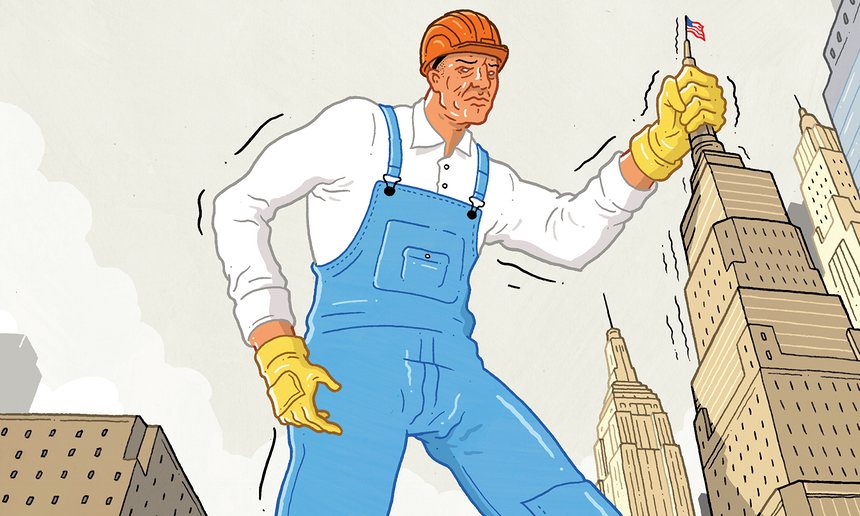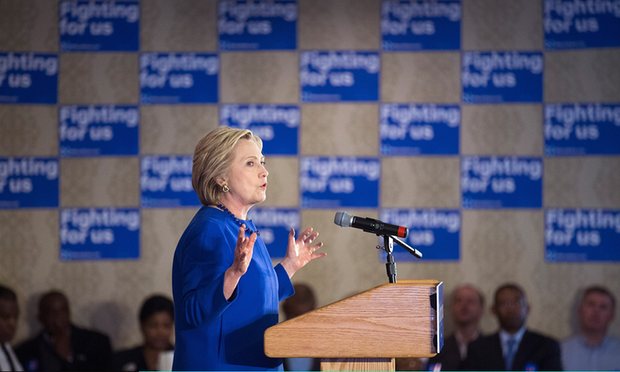
Date: 2024-12-21 Page is: DBtxt003.php txt00012310
US elections 2016
Why Trump won
Opinion ... Disaffected rust belt voters embraced Trump. They had no other hope ... Midwestern workers voted for Obama in 2012, but they have lost faith in the establishment. Trump echoed their resentments while promising change
Burgess COMMENTARY
Peter Burgess
US elections 2016 ... Opinion ... Disaffected rust belt voters embraced Trump. They had no other hope
Midwestern workers voted for Obama in 2012, but they have lost faith in the establishment. Trump echoed their resentments while promising change

Illustration by Jasper Rietman
The rust-belt rebellion that is propelling Donald Trump into the White House has been a long time building. The fact that it surprised so many politicians and pundits only shows the unbridged canyon between the urban elites who thrive on the globalised economy and the millions of Americans who live in its wreckage.
A decade ago, even before the 2008 recession, I interviewed workers in Dayton, Ohio, where Delphi, the global auto parts maker, was about to close four of its five plants and lay off 5,700 workers. I found some of them toying with the ideas of Lyndon LaRouche, a fringe, leftwing demagogue.
In my book about Dayton and other hollowed-out old industrial cities, I warned: “Globalisation is made to order for demagogues. By its nature, it exposes the vulnerable to distant and mysterious forces. It enriches a new class of global citizens, but undermines a way of life for middle-class workers who can’t understand what is happening to them and don’t feel they deserve it. This is not the way life was supposed to be, and they seek someone to blame.”
Dayton is in Montgomery County, which voted for Barack Obama in 2008 and 2012. This year, only seven of Ohio’s 88 counties stayed Democratic. Montgomery wasn’t one of them. Like dozens of industrial counties across the midwest, it gave its votes – and thus the election – to Trump.
The industrial midwest is the vast sweep, from western Pennsylvania through eastern Iowa, that drove the American economy for nearly a century. The great industrial cities, such as Chicago and Detroit, led the way, but it spread into hundreds of small towns and cities – from the steel mills of Ohio to the auto parts factories of Michigan and Wisconsin and the appliance makers of Iowa and Illinois.
This was Hillary Clinton’s blue wall, the states she had to win to become president. Of the 11 swing states that decided the election, five – Pennsylvania, Ohio, Michigan, Wisconsin and Iowa – lie in this battered old industrial heartland. If, as expected, Trump’s lead in Michigan holds, she lost them all. How did it happen? There are many reasons. The Clinton team barely campaigned there and in Wisconsin until it was too late. Misogyny played a role. So did Clinton’s personal unpopularity and the relatively low turnout.
But the real reason is that the industrial era created this region and gave a good middle-class way of life to the people who worked there. That economy began to vanish 40 years ago, moving first to the sun belt and then Mexico, before finally China. The good jobs that were left increasingly went to robots. Factories closed. So did the stores and bars and schools around them. The brightest kids fled to universities and then to the cities – to New York or Chicago or the state capital. Those left behind worked two or three non-union jobs just to stay afloat. Families broke up. Drug use increased. Life spans shortened.
Play VideoPlay Current Time 0:00 / Duration Time 10:49 Loaded: 0% Progress: 0% FullscreenMute Facebook Twitter Pinterest
Why America elected Trump
And nobody seemed to care – until Trump. But does he really? Who knows? He said he did. His tirades – against trade, against elites, against Obamacare, against immigrants, against the Clintons – sounded like unhinged rants in cities and on campuses, which never took him seriously. In the old industrial zones and withering farm towns, he echoed their own resentments. Mitt Romney couldn’t do this; neither could John McCain. But Trump did, and so they embraced him.
Why was this such a surprise? It’s impossible to overstate the alienation between the two Americas, between the global citizens and the global left-behinds, between the great cities that run the nation’s economy and media, and the hinterland that feels not only cheated but, worse, disrespected.
For the major media, almost all the campaign reporting focused on the candidates and polls. Almost nobody bothered to talk to the voters. The Chicago Tribune, the midwest’s biggest newspaper, doesn’t even have a midwestern beat any more and seldom sends reporters outside the Chicago metro area. Yet this was where the election was decided. Illinois may have voted Clinton and five of the six counties in Chicago’s metro region went Democratic, but of the 96 others, 91 voted for Trump. The Tribune missed the story and so did its readers.

Hillary Clinton campaigning in Illinois ahead of the election.
Facebook Twitter Pinterest
‘Misogyny played a role. So did Hillary Clinton’s personal unpopularity and the relatively low turnout.’ Photograph: Scott Olson/Getty Images
Clinton campaigned for expanded healthcare, for equal rights for women and the LGBT community, along with a rational foreign policy. Her website explained well-reasoned policies. She defended the nuclear deal with Iran and, until challenged by Bernie Sanders, new trade deals with Asia and Europe. Trump barely crafted any policies at all.
In the swing counties of the midwest, voters cared about none of this. They just wanted to be noticed. They didn’t care about equal pay for women: they wanted jobs and, with luck, rising salaries for everyone. In traditional towns that are just getting used to the idea of same-sex marriage, the right to choose one’s bathroom was simply frivolous. Trade was a huge issue. Democratic and Republican administrations both hew to the mantra of trade economists: that free trade may cause some local pain but boosts society as a whole. This teaching simply doesn’t jibe with the lived reality of workers who have seen imports replace the things they used to make.
Whenever I asked people in old industrial towns – not only workers but managers, too – what had happened, I usually got a one-word answer: “Nafta!”, spat out, like an epithet. They knew that something was happening to their lives and they blamed trade.
In Newton, Iowa, I interviewed Ted Johnson, a United Auto Worker official at the Maytag appliances plant, which Whirlpool had closed, with most of its 3,800 jobs going to Mexico. “We’ve got these terrific trade agreements,” he said. “They open up the whole world to third world countries with American incentives. They put impoverished workers to work, then sell the stuff back to the United States. Our government doesn’t even want us to have a decent standard of living.”
Newton is in Jasper County, which went for Obama in 2012 and, like 93 of Iowa’s 99 counties, for Trump this year. Across the Mississippi river, Galesburg, Illinois, lost 7,000 jobs, including 1,600 jobs when its own Maytag plant closed. Galesburg is in Knox County, which gave Obama a 58-41% victory margin in 2012 and voted for Trump this year.
Mostly, this was a backlash against cities, as any electoral map – an ocean of red with a few atolls of blue – can show.
In my book, I quoted Iowa agricultural blogger David Kruse who fumed that “ethics mean more in rural America than they do in urban America. What I see … are arrogant, liberal, urban elitists … that think they are smarter, more sophisticated, and better than those of us living in rural America. They think Washington and Des Moines know best and we poor dumb folks out here need their guidance and education.”
These industrial jobs aren’t coming back. Globalisation isn’t going away. Cities will keep growing, the hinterlands shrinking, filled with people who have lost everything except their vote.
If this country is to survive Trump and the wrenching economic changes he has exploited, attention must be paid.
Since you’re here …
… we have a small favour to ask. More people are reading the Guardian than ever but far fewer are paying for it. And advertising revenues across the media are falling fast. So you can see why we need to ask for your help. The Guardian’s independent, investigative journalism takes a lot of time, money and hard work to produce. But we do it because we believe our perspective matters – because it might well be your perspective, too.
Fund our journalism and together we can keep the world informed.
Become a Supporter
The reasons for Trump were also the reasons for Brexit John Harris John Harris Read more
Trump is right: Nafta is a disaster. But US workers aren’t the big losers Felicity Lawrence Read more